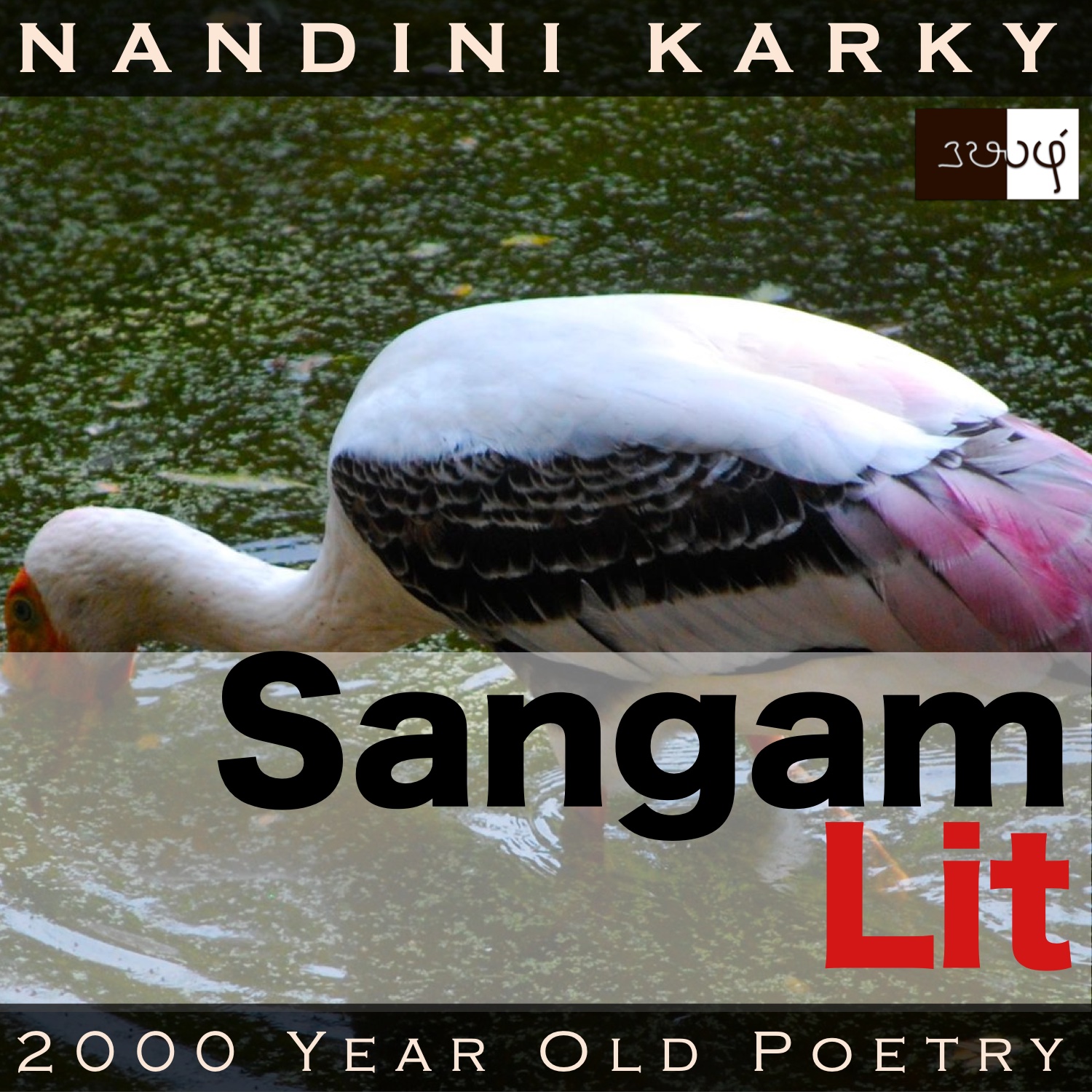Podcast: Play in new window | Download
Subscribe: Apple Podcasts | Spotify | Amazon Music | Android | iHeartRadio | TuneIn | RSS | More

In this episode, we perceive the changing seasons and its impact on a lady’s thoughts, as depicted in Sangam Literary work, Kurunthogai 103, penned by Vaayilaan Thevanaar. Set in the coastal regions of ‘Neythal’, the verse speaks in the voice of the lady to her confidante, conveying her emotions as the man is delayed beyond his promised season of return.
கடும் புனல் தொகுத்த நடுங்கு அஞர் அள்ளல்,
கவிர் இதழ் அன்ன தூவி செவ் வாய்,
இரை தேர் நாரைக்கு எவ்வம் ஆகத்
தூஉம் துவலைத் துயர் கூர் வாடையும்
வாரார் போல்வர், நம் காதலர்;
வாழேன் போல்வல்-தோழி!-யானே.
‘Drops of sorrow’ dot the frame of this verse! The opening words ‘கடும் புனல் தொகுத்த’ meaning ‘effected by harsh floods’ talk about the recent rainy season. Next, we meet with ‘அள்ளல்’ which means ‘trouble’ in modern Tamil but in this verse, means not the metaphorical ‘mire’ of misery but the real ‘mud’. A member of the plant kingdom greets us in ‘கவிர்’, which I learnt refers to ‘an Indian coral tree’, and more about that soon! Partnering with the plant, appears ‘இரை தேர் நாரை’ or ‘stork searching for a prey’. In that alliteratively exquisite phrase ‘தூஉம் துவலைத் துயர் கூர் வாடை’, the season and the changes in the landscape are outlined for it means ‘the cold season, which drizzles raindrops and heightens sorrow’. The phrase ‘வாரார் போல்வர்’ meaning ‘it seems like he will not return’ hints to us strongly that this is a song on separation and pining. Ending with the words ‘வாழேன் போல்வல்-தோழி!-யானே’ meaning ‘it seems like I shall not live, my friend’, the verse invokes our empathy!
Storks in the slush and tears that seem to gush! The context reveals that the man and lady had been leading a happy married life when the man parted away to gather wealth. Seeing the sad face of the lady when he was about to leave, the man promises that he would return before a specific season. After many days had passed by, the lady turns to her confidante and says, “In the slushy mud, left behind by severe floods, with shivering and suffering, a stork, with feathers akin to the ‘kavir’ tree petals and a red beak, digs for prey. Adding sharply to its troubles, the cold northern winds shower rain drops. Even in this season, it looks like he will not return, that lover of mine, and it looks like I shan’t live, my friend!” With these words, the lady tells her friend how there is no sign of the man even as the cold season commences and expresses her inability to bear with his parting any longer.
Time to explore the nuances in this verse! The lady starts not with the present but by mentioning the previous season of copious rains and floods that has left behind slushes on the land. Pointing to a shivering bird in the midst of this mire, the lady zooms on its wings and places it in parallel to the petals of ‘an Indian coral tree’. Let’s take a moment to get to know this tree better. On searching about this tree, I saw that akin to its name, the flowers had a unique shape of claws, the reason for its other name – tiger-claw tree, as well as a red hue. It’s rather rare to find a seabird that’s dashing red in colour. In the tropical forests, red could be a safe colour for the birds but surely not in the coastal regions! As I persisted with my search, I saw that this Indian coral tree had a rare variety called ‘alba’, which had white flowers, and looking at pictures of these white, claw-shaped flowers, with a soft tinge of pink in them, I could immediately make the connection to a painted stork, with its white feathers, coated with shades of pink. And it’s this bird, our lady is referring to, mentioning its red beak as well and telling us how it was digging for prey in that slushy water. Moving closer to the bird, the lady points to us how raindrops are falling on this shivering bird, brought by the cold northern winds.
With that, the lady declares that the cold season had arrived. She paints a portrait of this season as one which showers raindrops on birds and also makes suffering soar in the heart, and thus carves what this season effects both in the outer and inner landscape. Pointing to the arrival of this season, the lady says the man still had not arrived and so it seemed to her that she could not live any longer. Why do these ancients talk so lightly about not being able to live life? To me, it seems as if they want to glorify love more than life. To any living being, life is the most precious thing but literature seems to bring forth all those elements that are seemingly more important than life to humans. In some stories and poems, we find honour and ambition taking this place, and in here, we find love. Literature does seem to take this license to reveal the landscape of human emotions that go beyond mere living!




Share your thoughts...